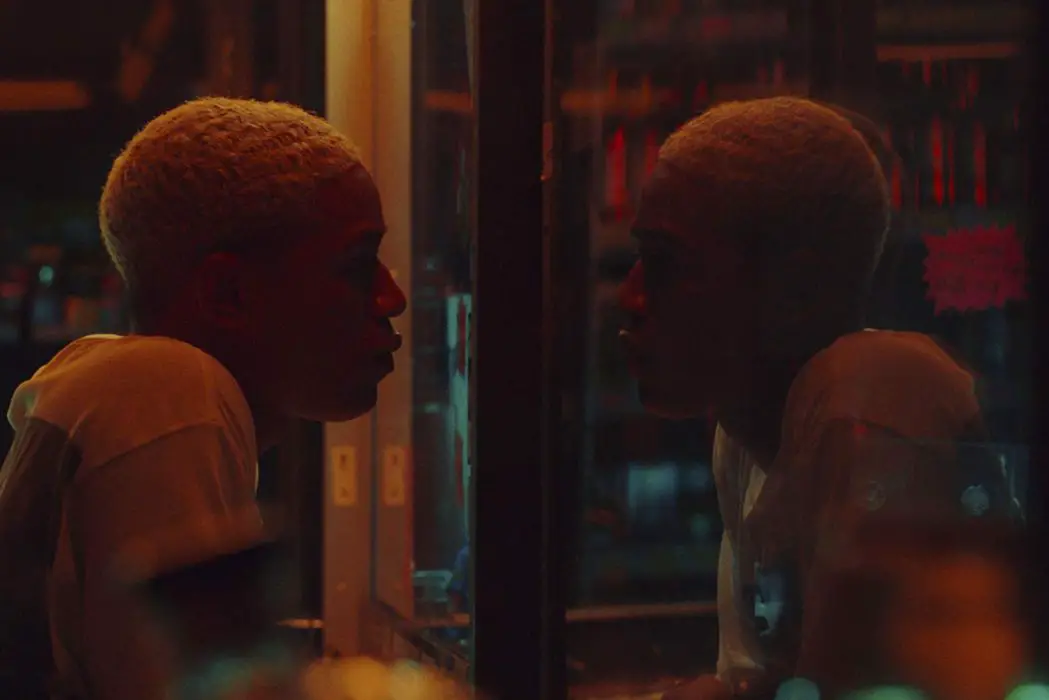WAVES: An Innovative Family Drama Told Through Tides Of Woe & Healing

Andrew Stover is a film critic/writer from the Chicagoland. His…
Like the trajectory of a real wave, Trey Edward Shults’ Waves is unrelenting and inevitable, abiding by a pattern that never ceases. In life, when misfortune washes over somebody, they can succumb to it completely, or attempt to see the light at the end of the tunnel. After making great dramatic strives with Krisha, and after the murky ambiguity of It Comes At Night, Trey Edward Shults is keen on assessing the nucleus of pain and the possibility for hope in Waves.
From the surface, Waves is another familial tale of tragedy and heartache, with the initial hallmarks and visual palette of a Barry Jenkin’s film, but Waves isn’t trying to be a mere imitation of Moonlight. Shults not only appreciates the universality of pain, but he engages with the audience in a non-traditional fashion that ends up paying off.

Set in Miami, the Williams family live successful lives. Athletic teen Tyler (Kelvin Harrison Jr. of the underseen Luce) is a skilled high school wrestler with bleached hair and unflagging grit, compelled by his well-intentioned yet domineering father, Ronald (Sterling K. Brown), to succeed. Tyler’s stepmother, Catherine (Renee Elise Goldsberry), is more understanding of Tyler’s pressure, and she tries hard to connect with him. Outside of school, Tyler gets caught up in the perpetual movement of youth: he goes to parties, hangs with friends, and maintains a relationship with his long-time girlfriend, Alexis (Alexa Demie). Tyler also has a sister named Emily (Taylor Russell), who is rather timorous but compassionate, and inches her way on-screen come the second half.
Unbeknownst to anyone at school or home, Tyler suffers from a Level 5 SLAP tear, which he keeps to himself to prevent the end of his wrestling career and hinder any future college prospects. Against doctor’s orders, Tyler continues to wrestle and steals his father’s pain meds, that is until a match goes awry and causes irreparable shoulder damage, ending his wrestling season and career. When Alexis becomes pregnant, Tyler’s world becomes more unclear, and both of their wants are performing against each other. One night, an intoxicated Tyler does the unthinkable, and Emily is forced to deal with the fallout of Tyler’s unalterable actions.
Waves Hits You With A Bruising Surge Of Heartbreak
The dire wave of tribulation in Waves comes steadily, first introducing us to the Williams family and the gleeful gambits of Tyler, who seems to be prospering as a wrestler and a romantic when we first see him. Cinematographer Drew Daniels sets the stage with a gripping succession of swooping and spinning camera shots, capturing the life of the Williams family with a sense of fluidity. Everyone is blossoming in their careers it seems, but something unsettling boils beneath the surface of this home of achievers and fighters, something that is intrinsically embedded by the functionality of life: Anguish.
Tyler is the center of the first half, casually relishing high school parties, loud car music, and the company of frivolous peers. Tyler’s popular, but that doesn’t mean he’s impenetrable. At home and at school, Tyler is invested in wrestling and fulfilling the wishes of his commanding father. Tyler’s interactions with his father (played by a flinty, forthright Sterling K. Brown) are considered to be tough love. Even so, Tyler’s juggling unfair expectations foregrounded by his father, who wholeheartedly believes that Tyler will have to work ten times harder than their white counterparts.

Shults beautifully depicts the euphoric aura of youth and its unbridled joy in the film’s first act, while also underlining the effect of expectations has on a teenager’s emotional state. That said, nobody, not even a teenager, can evade hardship when it unfolds in all of its unpredictability. Teenagers make irrevocable mistakes; anybody, of any age, race or gender, makes mistakes. But the question remains, can every mistake be forgiven? Can all pain be mollified? If so, how?
Tyler’s determination and stubbornness ends up being his own undoing. Forewarned by a doctor about a pernicious shoulder injury that could instantly get worse if he doesn’t stop wrestling, Tyler doesn’t listen. In fact, Tyler doesn’t tell his parents, he steals his father’s meds, and before he knows it, one wrestling match goes amiss and that’s the end of that facet of Tyler’s life. Drinking alcohol while taking pain pills is a match made by the Devil, so as you can imagine, what Tyler ends up doing one night is temerarious and disheartening, maybe even unforgivable for some viewers. An emotionally powerful Kelvin Harrison Jr. anchors the first half with his memorable performance as Tyler, whose line delivery is ardent, whose hundred-yard stares puncture the silence with tactile anger, and whose behavior becomes increasingly erratic.
Earlier this year, Kelvin Harrison Jr. played Luce Edgar in Julius Onah’s Luce, a sharply written and impressively acted race drama about a child soldier who was adopted and raised by a liberal couple. The conversation of expectations, wealth, race and one’s origins were exhaustively divulged in Luce. Whilst Harrison Jr.’s Luce is in control of his emotions and utilizes them to deceive others, Harrison Jr.’s Tyler doesn’t have full control over his emotions. Both of these outstanding performances paint Harrison Jr. as a rising talent, and he’s being criminally overlooked.
On a different note, the swirling camerawork first appears to highlight the elation of Tyler’s endeavors, but very slowly, the fluctuating camera becomes more hostile or unnerving, implying imminent disorder. Alongside the busy camerawork, Trent Reznor and Atticus Ross’ brash and overwhelming score (and a soundtrack consisting of Kendrick Lamar, Kayne West and Frank Ocean) assume the rhythm of a radio dial, constantly switching between stations and sounds and giving way to a stream of clashing emotions.
When Tragedy Strikes, Healing Is Possible
The second hour passes the torch down to Tyler’s timid sister, Emily, who is left to deal with the aftermath of Tyler’s actions. Without spoiling what Tyler did, let’s just say he’s out of the picture, and his abrupt absence puts a strain on the Williams family. Ronald (Sterling K. Brown) and Catherine’s (a convincingly vulnerable Renee Elise Goldsberry) relationship is in a debilitated state. A dejected Catherine can barely get out of bed and go to work, and she blames Tyler’s downfall on Ronald for incessantly pushing him to succeed. Albeit the parents’ perspective isn’t largely seen, Ronald’s teachings as a father definitely trigger the discourse on familial pressure and black excellence.
Unlike her brother, Emily isn’t very sociable, and the recent events that transpired aren’t helping with her state of mind and her family’s image. Social media further isolates Emily from people. Played by a modestly stirring Taylor Russell, she reacts without luridly exposing her character’s anger or dolor. Emily doesn’t scream or burst into tears, she remains taciturn and in the background, trying not to capitulate to the clamor of deprecating peers. Emily’s left unaccompanied by anyone at school, and hears the echoes of her parents fighting in the other room. Everything is falling apart.

Moderately, the broken pieces fall back into place. The dorky and adorable Luke (Lucas Hedges of the recent Honey Boy) comes along to sweep Emily off her feet. Emily and Luke develop endearing chemistry, and the world becomes a bit more brighter. At one point, the story is expanded beyond the Williams clan, as Luke also gets the chance to forgive. And that’s the comprehensive kernel of Waves, the ability to forgive. Redemption, clemency and love are human emotions. Granted, we love differently, and we choose to forgive some people and condemn others, thinking we will never absolve them from their wrongdoings, yet we evolve as human beings by forgiving.
As he did with It Comes at Night, Shults tinkers with aspect ratio, beginning with an expansive widescreen view of Tyler (1.85:1 ratio), as the exultation of youth holds no limits. As Tyler’s world begins crumbling, Shults tightens the ratio, signalizing when everything is closing in around Tyler. During the transition to Emily, you see her getting crushed under the weight of her family’s grief (1.33:1 ratio). But gradually, the aspect ratio re-expands as she opens her dismal world to love and forgiveness, concluding with the same crux of awe and freedom we met Tyler with.
Waves Is Spirituous & Grounded At The Same Time
Throughout, Shults’ expressionist techniques enhance the family’s strives to regain grace and familial strength — from the restless cinematography (that becomes hauntingly still when it becomes Emily’s story), color palette and aspect ratio changes, and the ear-splitting score that vivifies the aura of a scene. When an actual wave rolls in, it loudly crashes on the shore and starts retreating back into the sea, only to do it again — just like the traumatic, doleful or hopeful moments of life. There’s a chance to endure the wave of distress, only to emerge stronger than before. Like the pulse of life, in Waves, there are times to laugh, to cry, to mourn, to smile and to hope. And the biggest weapon we wield is the capacity to forgive and persevere.
In Trey Edward Shults’ visually arresting drama Waves, a suburban African-American family finds their world fractured by tragedy. In many cases, this tragedy would be a means to conclude the picture on a mightily dolorous note, but Shults seeks refuge in the wreckage. In return, viewers will get swept up by Shults’ technically innovative and emotionally resonant drama about forgiveness and healing. Not all viewers will be equipped to tolerate Shults’ visual intensity, but there’s a purpose for all of this sensory mischief.
Have you seen Waves? If so, what are your thoughts on it? Was it sensory overload?
Waves was released in the U.S.A on November 15, 2019, for a limited theatrical run. It was then released on January 17, 2020, for UK audiences.
Does content like this matter to you?
Become a Member and support film journalism. Unlock access to all of Film Inquiry`s great articles. Join a community of like-minded readers who are passionate about cinema - get access to our private members Network, give back to independent filmmakers, and more.
Andrew Stover is a film critic/writer from the Chicagoland. His film & TV reviews can be found on Film Inquiry & Film Threat.













